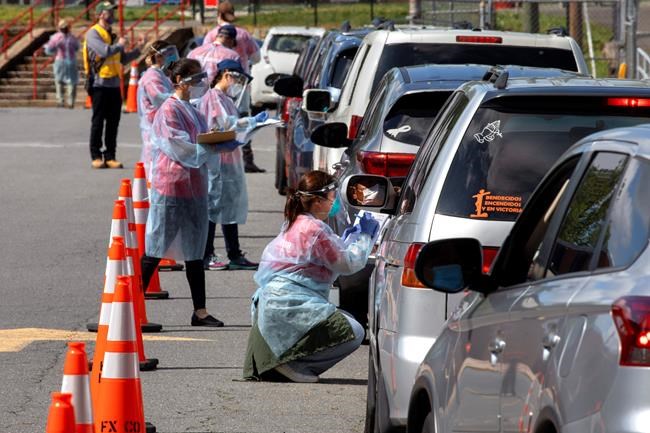Science summary: A look at novel coronavirus research around the globe
by Bob Weber
Thousands of scientists around the world are working on problems raised by the COVID-19 pandemic. Here is a summary of some recent research from peer-reviewed academic journals and scientific agencies:
---
The International Journal of Infectious Disease has tracked the source of Canada's first 118 cases of COVID-19. It found that despite nearly two-thirds of the world's cases originating in China, and despite Canada's large human and trade links with that country, only nine (7.6 per cent ) of Canada's earliest cases originated there. Researchers say the most commonly reported travel among the 118 cases involved the Middle East, the United States and Europe. Nearly one-third — 30 cases — were from Iran. Researchers say the results suggest that future travel bans shouldn't necessarily be restricted to only countries with high levels of infection.
---
The novel coronavirus has mutated thousands of times, but a large study from University College London suggests none of those mutations has made it more transmissible. The paper, which hasn't been peer-reviewed, looked at more than 15,000 COVID-19 patients from 75 countries. It found 6,822 mutations. Of those, 31 mutations have occurred at least 10 times independently during the course of the pandemic. Researchers found no evidence those common mutations increased the virus’s transmissibility — including one mutation which has been widely credited with being more infectious. In fact, they found most mutations were mildly detrimental to the virus.
---
An unreviewed study from the Universite de Paris found cases of Kawasaki disease in children, which causes swelling blood vessels, seem to be associated with COVID-19. It found 17 children were admitted to the university hospital between late April and early May this year, when the average number of cases is one. Fourteen youngsters showed evidence of recent infection by the novel coronavirus. They also suffered gastrointestinal distress. All were treated and successfully recovered.
---
The journal The Lancet has published one of the largest studies yet on the value of hydroxycholoroquine as a COVID-19 treatment. The study looked at 96,032 patients from 671 hospitals on six continents. The paper reports no benefit from the antimalarial drug, either on its own or with anything else. It says hydroxychloroquine, which has known side effects on the heart, may cause more problems than its solves — although the paper cautions that conclusion isn't definitive.
---
Studies in macaque monkeys suggest that developing immunity against COVID-19 is possible for humans, either through exposure to the virus causing it or through a vaccine, reports the journal Science. Researchers are still trying to determine if being infected with the virus creates immunity against future exposures. In this study, nine adult macaques who had recovered from an infection were exposed again 35 days later. All showed little to no symptoms and exhibited immune responses that protected against the second infection. The same researchers then inoculated 35 macaques with prototypes of six different COVID-19 vaccines and exposed the animals to the novel coronavirus. Antibodies showed up in all the monkeys' bloodstreams.
---
A paper in the journal Science Immunology warns that testing for COVID-19 antibodies may be a good way to assess the immunity of large groups, but not of individuals. The authors suggest such tests could help with public-health questions such as when to relax stay-at-home orders or school closures. But they add such tests aren't accurate or specific enough to determine if any one person is immune to infection, throwing into question the value of so-called immunity passports. Using currents tests for that purpose is insufficient and potentially harmful, they say.
---
This report by The Canadian Press was first published May 25, 2020